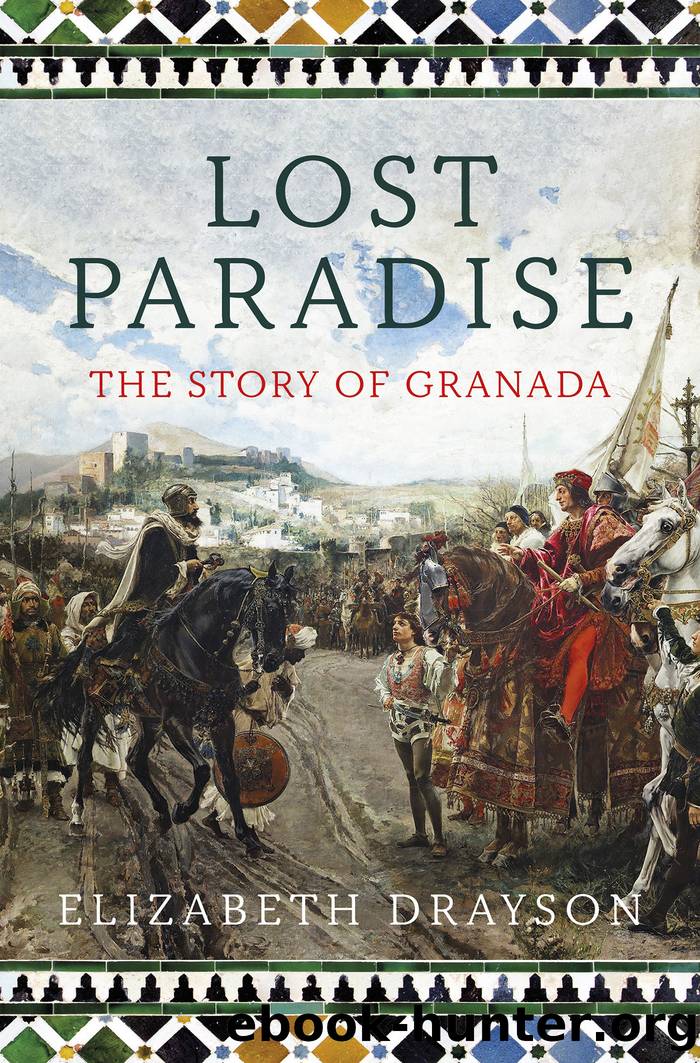Lost Paradise by Elizabeth Drayson

Author:Elizabeth Drayson [Drayson, Elizabeth]
Language: eng
Format: epub
ISBN: 9781788547444
Publisher: Head of Zeus
Chest containing the funerary relics of the martyrs on the altar of the collegiate church of the Sacromonte.
© Archivo AbadÃa del Sacromonte
Aerial view of the Abbey of the Sacromonte.
Lukasz Janyst/Alamy
Miguel de Luna is the most fascinating, mysterious and complex of all the personages who play a part in the drama of the Lead Books. When he sat in his Sacromonte house translating the Torre Turpiana parchment he was about thirty-eight years old, born in Granada around 1550 into a noble Morisco family originally from nearby Baeza. As a young man he learned Arabic and studied medicine at the newly founded university in the city. He worked as a physician in Granada but it was authorship that became fundamental to his life as the vehicle through which he conveyed his radical, subversive views. Lunaâs treatise on bathing, written in 1592 and reflecting the latest medical thinking, was a thinly veiled political and religious statement about the importance of restoring the prohibited Morisco practice of taking baths, which purported to discuss their therapeutic value from a solely scientific, pragmatic perspective. His ulterior motive was unsuccessful as the treatise was never published, but the very opposite was the case with a work written in the guise of his other profession of translator. The True History of King Roderick (Verdadera Historia del rey don Rodrigo) was published in 1592 as a crucial reinterpretation of the events surrounding the Muslim invasion of Spain in 711, which sought to render the Arab Muslims comprehensible and acceptable to Christian culture. Luna alleged that his history was the translation of an unknown Arabic source he found in the library of El Escorial. The account was very popular, with seven reprintings and translations into other European languages, but it transpired that this âtrue historyâ was in fact a colossal fabrication, which fooled many learned people including the two Inquisitors who assessed whether it should be censored or not. Boldly dedicated to King Philip II, Lunaâs alternative history aimed to give political and religious legitimacy to the Moriscosâ claim that they had the right to live in Spanish territory, and was written at a time when the Church was acting fast to close out any traces of religious otherness. It ventured towards a utopia of mutual tolerance between Arabs and Christians by capitalizing on Spainâs Achilles heel, the inability to distinguish between illusion and truth.
For Miguel de Luna, words were power at a time when Moriscos in Granada, as well as those in internal exile, were a powerless minority. The most crucial aspect of his life was his ambiguous involvement with the Lead Books, initially as their translator in his capacity as a converted Muslim member of the elite Christian royal establishment. He began work on translations of the first two lead texts in May 1595 and issued a very persuasive report for the king in October, adamantly supporting their antiquity because, he asserted, the great age of the lead they were made from proved they were too ancient to
Download
This site does not store any files on its server. We only index and link to content provided by other sites. Please contact the content providers to delete copyright contents if any and email us, we'll remove relevant links or contents immediately.
Room 212 by Kate Stewart(5105)
The Crown by Robert Lacey(4808)
Endurance: Shackleton's Incredible Voyage by Alfred Lansing(4770)
The Iron Duke by The Iron Duke(4350)
The Rape of Nanking by Iris Chang(4204)
Joan of Arc by Mary Gordon(4104)
Killing England by Bill O'Reilly(3997)
Say Nothing by Patrick Radden Keefe(3975)
I'll Give You the Sun by Jandy Nelson(3429)
Shadow of Night by Deborah Harkness(3361)
Hitler's Monsters by Eric Kurlander(3330)
Mary, Queen of Scots, and the Murder of Lord Darnley by Alison Weir(3208)
Blood and Sand by Alex Von Tunzelmann(3196)
Eleanor & Park by Rainbow Rowell(3153)
Darkest Hour by Anthony McCarten(3119)
Margaret Thatcher: The Autobiography by Thatcher Margaret(3081)
Book of Life by Deborah Harkness(2934)
Red Famine: Stalin's War on Ukraine by Anne Applebaum(2930)
The One Memory of Flora Banks by Emily Barr(2857)
